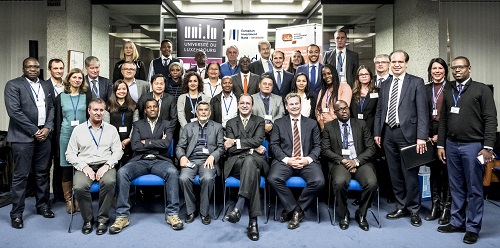The third edition of the Certificate in Law and Regulation of Inclusive Finance wrapped up on 24 January, with 18 participants from 12 countries across Africa, Asia, Central and South America completing the two-week course.
The Certificate forms part of a cooperation between the University of Luxembourg and Appui au développement autonome (ADA). It is further supported by the European Investment Bank (EIB) Institute and the Luxembourg Ministry of Foreign Affairs.
Among this year’s participants were Anna Ria Manahan, programme manager at the Microfinance Council of the Philippines, and Amir Faizi from Jamia Millia Islamia public university in New Delhi who is also active for a microfinance NGO in India.
“The Philippines are proactively working on financial inclusion and this was a good opportunity to learn about financial inclusion at international level but also to see what different countries are doing,” explained Ms Manahan. “The courses provided a good variation of topics and discussions for you to be able to have a good grasp of the financial inclusion ecosystem.”
Ms Manahan now hopes to bring this knowledge back to the Microfinance Council which supports its members in capacity building but also delivers technical support.
Even though participants of the certificate came from countries as varied as Brazil, Burundi, Cambodia, Chad, Guatemala, India, Ivory Coast, Nepal, Nigeria, Pakistan, the Philippines and Tanzania, they quickly found common ground, according to Mr Faizi. “We have a lot of different experiences and backgrounds but the goals are the same, the passion is the same.”
‘The solution is within your society’

The closing of the programme was marked with a reception hosted at the EIB where participants were congratulated by the Dean of the EIB Institute, Francisco de Paula Coelho who urged them to keep in contact and use the network they built over the past weeks in future.
This feeling was reiterated by Laura Foschi, Executive Director at ADA. “I hope that you share the knowledge, thoughts and insights gained from these two weeks at home,” she said, inviting the group to stay connected with ADA’s activities in their countries or regions.
Also at hand to congratulate the cohort was Thomas Lammar from the Ministry of Foreign Affairs who praised the initiative to build knowledge and expertise in inclusive finance as a way to help “eradicate poverty and support economic development.”
To achieve this goal, concluded the programme’s director, Prof. Dirk Zetzsche, each of the participants should use the skills gained to “tailor the solution adapted to your environment. The solution is within your society, in your soul and in your mind,” he said. “Have confidence, accept failure and try again.”
In order to help foster a network of experts around the world, the Uni.lu team will start coordinating webinars and digital platforms of exchange for participants of the certificate from this and the two previous years. “We want to continue the discussion with you,” said Prof. Zetzsche.
The fourth edition of the Certificate in Law and Regulation of Inclusive Finance is scheduled to take place in January 2020. Information will be updated on the programme’s website in due course.
